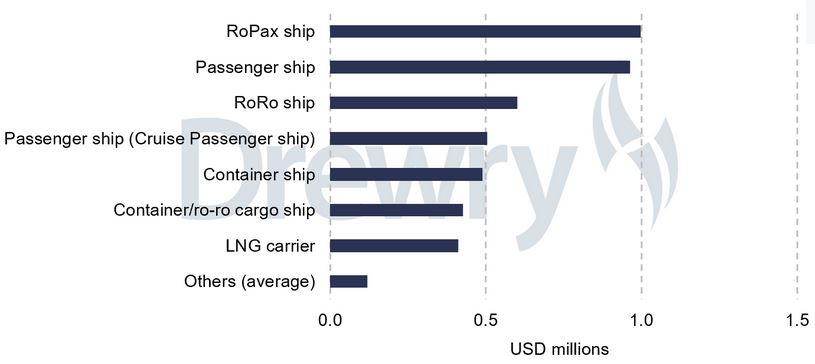 Around 13,000 vessels reported their 2024 data on the EU MRV platform in compliance with monitoring, reporting and verification (MRV) guidelines, according to Drewry.
Around 13,000 vessels reported their 2024 data on the EU MRV platform in compliance with monitoring, reporting and verification (MRV) guidelines, according to Drewry.
The carbon dioxide emitted by these vessels in 2024 must be paid for by surrendering 40% of EU Allowances (EUAs) for each tonne of CO2.
The first due date for shipping industry payments is 30 September 2025.
According to EU MRV data, around 90 million tonnes of CO2 were emitted within the scope of the EU Emissions Trading System (EU ETS) in 2024, an increase of around 14% compared with the previous year.
The increase was partly driven by geopolitical factors, which forced vessels to take longer routes via the Cape of Good Hope instead of the Suez Canal.
The container sector accounted for 16% of the vessels, or 21% in terms of deadweight capacity, but emitted about 34% of the total CO2 emissions.
With the current EUA price at around EUR 70, Drewry estimates that responsible parties will have to pay approximately USD 2.9 billion in October 2025.
If emissions remain at similar levels, the total cost is expected to reach around USD 7.5 billion when the phase-in period ends in 2026 and all greenhouse gases are included in the scope.
On average, each RoPax and passenger vessel will pay about USD 1 million towards the EU ETS, while each container vessel will pay about USD 0.5 million.
Shipping companies calling at EU ports are introducing measures to reduce their emissions, including retrofitting energy-saving technologies, using sustainable biofuels, adding alternative-fuel vessels, and applying advanced antifouling and low-friction paints.
Container companies such as Maersk, CMA CGM and Hapag-Lloyd have introduced transparent surcharges to cover the cost of emission allowances.
They also offer specialised services that allow customers to select lower-carbon shipping options, marketed under brands such as Maersk’s “ECO Delivery”, CMA CGM’s “ACT+” and Hapag-Lloyd’s “Ship Green”.
The European Union intends to align its rules with the International Maritime Organization’s expected Net Zero Framework after its likely adoption in October 2025.
In addition, FuelEU Maritime, in force since 2025, is expected to support the reduction of greenhouse gas emissions in the region.
Drewry is a private maritime research and consulting firm headquartered in London, providing market intelligence, advisory services and sector analysis to shipping companies, ports, financial institutions and other stakeholders in the maritime industry.



